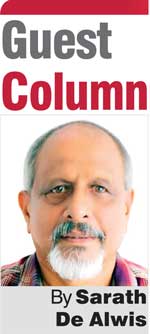Monday Feb 16, 2026
Monday Feb 16, 2026
Monday, 3 April 2017 00:02 - - {{hitsCtrl.values.hits}}

Former Central Bank Governor Arjuna Mahendran leaves the Presidential Commission of Inquiry to Investigate and Inquire into the Issuance of Treasury Bonds in Colombo - REUTERS/File photo
“Better to leave our clothes here and go naked to sign this.” This statement made the news in the 27th month of the Government of the Sirisena-Wickremesinghe duumvirate. Why are clothes so important? The question is daft, nutty and wacky.
But then we live in wacky times, in a nutty land. Being daft seems a state of bliss!
Why do humans cover themselves, their genitals in particular? In these transformational times of good governance, the issue of covering or uncovering genitals gathers immediate, present relevance.
Giving evidence before the Special Presidential Commission probing the Central Bank Bond controversy, an Assistant Governor of the Central Bank has explained how he expressed his categorical dissatisfaction with decisions made by the tender board or committee that evaluated the bids, selected one and sent the new Government into a tailspin. He had made his objections clear, with an authentic Sinhala idiom – “Better to leave our clothes here and go naked to sign this.”
This statement brings into focus an aspect that the UNP administration has steadfastly refused to acknowledge ever since the so-called bond scam captured the public’s imagination.
It totally undermined the good governance initiative that held so much promise in the first four weeks after 8 January 2015.
No doubt, the Presidential Commission will report on its findings and public anger will be appeased, or so we hope. This sorry spectacle dragging on for two years and more has demonstrated that the UNP is a party that has no sense of shame. It does not by any means imply that other parties do! They are as shameless as the present lot but having been caught with their pants down and now in the Opposition they are content to wallow in their soulless shame.
The focus is currently on the Brahmins who gravitate around 5th Lane Colombo 7. It is a modern version of the Gita. In the original, Krishna is duty-centric and Arjun worries about the consequences of going into battle. In the new version, Krishna is laughing all the way to the Central Bank. Poor Arjun brought down for the purpose from Sinhapura seems to have done his duty and is now grappling with the consequences. Others in the pantheon of small gods - Malik, Ravi, Paski and Charitha - are hell-bent on keeping the gravy chariot afloat.
Anticipated and Experienced shame
There are two aspects of shame. There is the anticipated sense of shame and the experienced sense of shame. By its stubborn refusal to allow an open, transparent investigation, precipitating the dissolution of Parliament before the DEW Gunasekera committee report could be tabled, the attempted sweep under the carpet by what this writer once described as the ‘Pana Yana Report’ of the Pitipana committee, the UNP has shown that it has no sense of shame.
Then we come to the experienced sense of shame. The UNP and its leader in particular have demonstrated that our Serendib has more rhino hides than Serengeti Park.
Both anticipated and experienced senses of shame intrinsically hold a deep desire to cover what is exposed. But that was not the case with Finance  Minister Ravi Karunanayake. When told that his fly was open, instead of zipping it up, he got into combat mode and seemed keener to unzip Nivard Cabraal.
Minister Ravi Karunanayake. When told that his fly was open, instead of zipping it up, he got into combat mode and seemed keener to unzip Nivard Cabraal.
‘Redi Andagenada Me Wadey Karanne’ is a Sinhala remonstration of unethical conduct. ‘Redda Palley Berenawa’ is a picturesquely expressive way of stressing the telltale exposure of an indiscretion. ‘Thamusege Redda’ is a decisive dismissal of a counter narrative with a subtle hint linking dress with the need to cover genitalia. Then there is the all-encompassing omnibus dictum ‘Lajja Nathikama Maha Mudali Kamatath Wada Loukiy’. Shamelessness surpasses the haughtiness of the feudal grandee.
When asked by one of the commissioners if there were other members of the tender committee present when he made that trenchant comment, the Assistant Governor answered in the affirmative. He said that three others were present. He named them – two ladies and a gentleman.
The thin thread that holds human dignity together is the assumption that being unclothed in public is an act of shame. This sense of shame is deeply ingrained in the normal human psyche. That seems to change when humans start politicking!
This writer was recently treated for a medical condition called pathologic phimosis which required surgical intervention in the genital area. It was an excruciatingly painful and maddeningly inconvenient business. The most disagreeable and nerve-racking concern was the fear of inappropriate excitement in the presence of female nurses. As it turned out, fear and pain cancelled out any descent into excitement, inappropriate or otherwise.
In sharp contrast, the governance practices of the UNP are not inhibited by the fears of inappropriate excitement. What is inappropriate in general seems to excite the UNP more. This was amply demonstrated by Parliamentarian Sujeewa Senasinghe in the debate on the bond scam.
Speaking of exciting enterprises, the Minister of Tourism does not score high on this writer’s scale. He likes to do it the French way even in Berlin.
Lack of proper conduct
As the saying goes, we are all born with no clothes. We later acquire a sense of shame when unclothed. Having clothes on is an essential cannon of human conduct, public etiquette and social deportment.
Quite apart from the spontaneity of the Assistant Governor’s remark, it was a desperate cry of anguish by a trained economist. The utter disregard for ethical conduct, established etiquette and conscientious deportment of those who wielded discretionary power to invalidate his opinion made him burst out with that instinctive cry of shame.
Conversely, the conclusion should be that those responsible in the Central Bank at the time did not mind parading in the nude. They assumed, as is usual with the upper classes, that orgies in their cloistered confines would not be visible to us, the ordinary folk. They were quite blasé about its outcome.
They were confident they could hold the lid in place. Remember their insistence that Charitha Ratwatte be allowed to hold the covering shroud? The UNP’s intractable premise was that it was business as usual. Nobody looks and therefore nobody will see.
In this premise, the present writer has anecdotal evidence to support the UNP theory. For years this writer used a shower in a secluded part in his rear garden. Creeping urbanisation has now reached his rear fence. There are joggers and other regulars of varying vocations now passing regularly past the once secluded shower area.
Impervious to the urban tide, this writer continues to shower in the open, in exposed disdain, just as the monetary moguls of the UNP did in the bond business. However, his formal and fussy lady implores that he should come to terms with reality and stop showering in the nude where people may see. But he insists, for people to see, they must look. He argues that light travels in a straight line. If you don’t look, you don’t see. At least in stubborn resistance to sensible opinion this writer shares a character trait with the Prime Minister.
That dear reader is the saga of bonds. The Pitipana committee was appointed not to look but to explain. They did not see. They explained. Now we wait for the findings of the Commission of Inquiry.
There is only one way out of the impasse. Our democracy cannot be better or worse than the society that sustains it, in its own fashion.
The Rajapaksa autocracy relied on top-down traditional leadership which we called tyrannical, which it certainly was. The current leadership does not enjoy the luxury of a predictable and stable environment that Gota and Hendavitharane made possible for MR.
The President, who cannot dissolve Parliament, must now request Parliament to dissolve itself. There is a new science called chaos in the field of Physics. The people alone can find a nonlinear exit out of our present chaos. “I am hurt. A plague o’ both your houses! I am sped.”